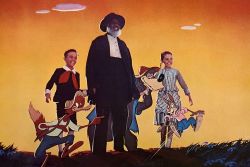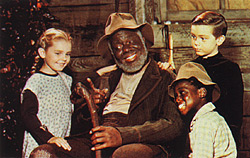Song of the South
Song of the South, a live-action/animation hybrid released by RKO Radio Pictures and produced by Walt Disney back in 1946. Harve Foster and Wilfred Jackson directed Song of the South. The film follows an innocent young boy named Johnny (Bobby Driscoll) from Atlanta who moves with his mother to his grandmother's plantation, based on author Joel Chandler Harris' collection of Uncle Remus stories. (His father remains in Atlanta to work as a newspaper editor) On the plantation, Uncle Remus (James Baskett) teaches Johnny a series of life lessons through stories about the animated Br'er Rabbit (voiced by Johnny Lee) and his quest to avoid Br'er Fox (Baskett) and Br'er Bear (Baskett) (Nick Stewart). Among these cartoon interludes is "Zip-a-Dee-Doo-Dah," which won the Academy Award for Best Original Song and is one of the most well-known and well-loved songs of all time in the Disney library.[1]
Plot
Johnny, seven years old, is looking forward to a vacation with his parents, Sally and John Sr., at his grandmother's Georgia plantation. When they arrive at the plantation, he learns that his parents will be living apart for the time being, and that he will be living with his mother and grandmother at the plantation while his father returns to Atlanta to resume his job. Johnny, distraught about his father's departure, sneaks away to Atlanta with just a bindle that night.
The voice of Uncle Remus telling stories about a character named Br'er Rabbit draws Johnny away from the plantation. By this time, word of Johnny's disappearance had spread throughout the plantation, and some residents were on the lookout for him. Johnny manages to avoid detection, but Uncle Remus finds him, befriends him, provides him with food for his journey, and takes him back to his cabin, where he tells him the traditional African-American folktale "Br'er Rabbit Earns a Dollar a Minute." Br'er Rabbit tries to run away from home in the story, but after meeting Br'er Fox and Br'er Bear, he reconsiders. Johnny heeds Uncle Remus' advice and allows him to return to his mother.
Toby, a young black boy who lives on the plantation, and Ginny Favers, a poor white girl, become Johnny's friends. After her two older brothers, Joe and Jake, threaten to drown the puppy, Ginny gives it to Johnny. Johnny's mother won't let him keep the puppy, so he gives it to Uncle Remus. Uncle Remus takes the dog in and tells the story of Br'er Rabbit and the Tar-Baby to Johnny and his friends. The boys go to their mother to talk about the dog, only to discover that Johnny had duped them. They tell Sally about the dog as a form of retaliation. She is irritated that Johnny and Uncle Remus kept the dog against her wishes. Uncle Remus is told not to tell any more stories to her son.
When Johnny's birthday arrives, he picks Ginny up and takes her to his party. Joe and Jake push Ginny into a mud puddle on the way there. Ginny is unable to attend the party because her dress has been ruined, and she runs away crying. Uncle Remus intervenes in Johnny's fight with the boys, breaking up the fight. Johnny rushes off to console Ginny, who expresses his reluctance to leave. Sally becomes enraged at Johnny for missing his own birthday party and tells Uncle Remus not to spend any more time with him when the three return to the plantation. Uncle Remus packs his belongings and departs for Atlanta, saddened by the misunderstanding of his good intentions. Johnny rushes to stop him, but he is seriously injured after cutting through a pasture. Johnny's father appears as he teeters between life and death. Johnny summons Uncle Remus, who is escorted in by his grandmother. Uncle Remus starts telling a story about Br'er Rabbit and the Laughing Place, and the youngster miraculously survives.
Later, a fully recovered Johnny sings with Ginny and Toby, accompanied by Johnny's returned puppy. When Br'er Rabbit and several other characters from Uncle Remus' stories emerge in front of them and engage with the youngsters, Uncle Remus is taken aback. Uncle Remus joins the group, and they all skip away into the sunset together.
The Controversy
Song of the South has been a source of contention since its initial release. Some reviewers have called the film's depiction of African Americans racist and offensive, claiming that the black vernacular and other characteristics are stereotypes. Disney has not launched Song of the South on any home video format in the United States as a result of the dispute.[2]
There are many instances of pernicious bigotry in Song of the South on the surface: the ministry of cartoon characters, in particular Br'er Fox; the dialect in dialogue; the roaming chorus singing traditional black songs; and, most notoriously, the fable in which Br'er Fox and Br'er Bear use a tar kid to fool and snare Br'er Rabbit. (That part didn’t make Splash Mountain.) Yet the subtle low point of the film comes from Remus' narration just before Zip-a-Dee-Doo-Dah, when he recalls how things were “a long time ago,,” when “every day was mighty satisfactual”. “If you’ll excuse me for saying so,” he adds, “’twas better all around.”[3]
Adam Clayton Powell, Jr., a congressman from Harlem, branded the film as "an insult to American immigrants [and] all that America as a whole stands for." The National Black Congress set up picket lines in theaters in the major cities where the film was being played, with its demonstrators raising posters that read "Song of the South is an insult to the Black community" and chanting "Jingle Bells": "Disney says, Disney tells/lies about the South."[4]
Some of the black press had mixed responses to the Southern Song. Although Richard B. Dier in The Afro-American was "very appalled" by the film for being "as vicious a piece of propaganda for white supremacy as Hollywood has ever made" Herman Hill, in The Pittsburgh Courier, thought the Song of the South would "prove inestimable goodwill in the furtherance of interracial relations" and found the film's critique to be "unadulterated hogwash symptomatic of the unfortunate racial neurosis that so many of our humorless brothers appear to be gripping these days."[5]
Release
Song of the South has never been released as a home video in the United States. Disney CEO Bob Iger said, "It wouldn't be in the best interests of our shareholders to put it back even if there would be any financial benefit." However, there is a release of VHS and LaserDisc abroad.[6]
Since the release for the film's 40th anniversary in 1986, Song of the South was sealed in a vault. Asked if the movie ever had a DVD release, Disney CEO Bob Iger called it "antiquated" and "fairly violent." While Disneyland's Splash Mountain is entirely devoted to the forgotten feature, South Song is scarcely spoken of in any way other than a racial misstep for the studio.[7]
External Link
Song of the South at IMDb
Song of the South at Rotten Tomatoes
References
- ↑ Matt Singer. Just How Racist Is ‘Song of the South,’ Disney’s Most Notorious Movie?, screencrush.com, March 4, 2016. Retrieved December 22, 2020.
- ↑ Song of the South. Retrieved December 22, 2020.
- ↑ Scott Tobias. Song of the South: the difficult legacy of Disney's most shocking movie, theguardian.com, 19 November 2019. Retrieved December 20, 2020.
- ↑ Watts, Steven (2001). The Magic Kingdom: Walt Disney and the American Way of Life. University of Missouri Press. pp. 276–277. ISBN 0-8262-1379-0.
- ↑ Gevinson, Alan (1997). Within Our Gates: Ethnicity in American Feature Films, 1911-1960. California: University of California Press. p. 956. ISBN 978-0520209640
- ↑ Ryan Lattanzio. ‘Song of the South’: 10 Fast Facts About Disney’s Most Controversial Movie, indiewire.com, 3 November 2019. Retrieved December 20, 2020.
- ↑ Tom Chapman. 15 Classic Cartoons That Would Definitely Be Censored Today", cbr.com, 27 November 2017. Retrieved December 20, 2020.

